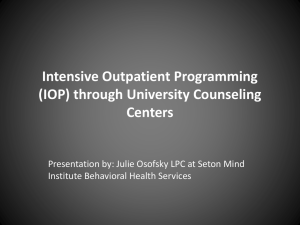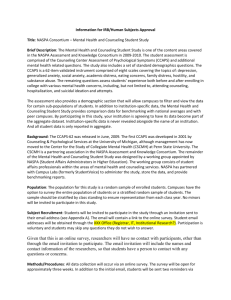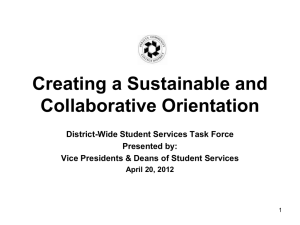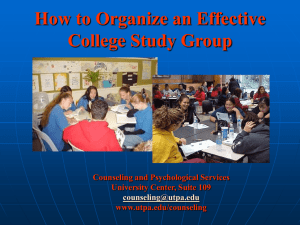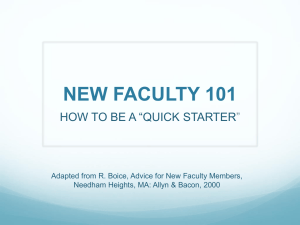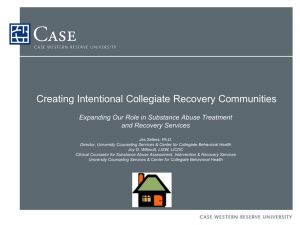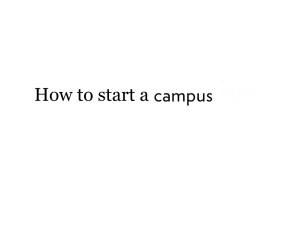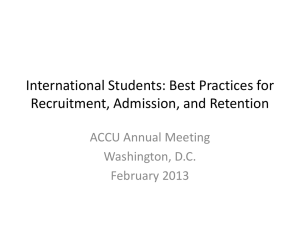Students of Concern - Office of Legal Affairs
advertisement
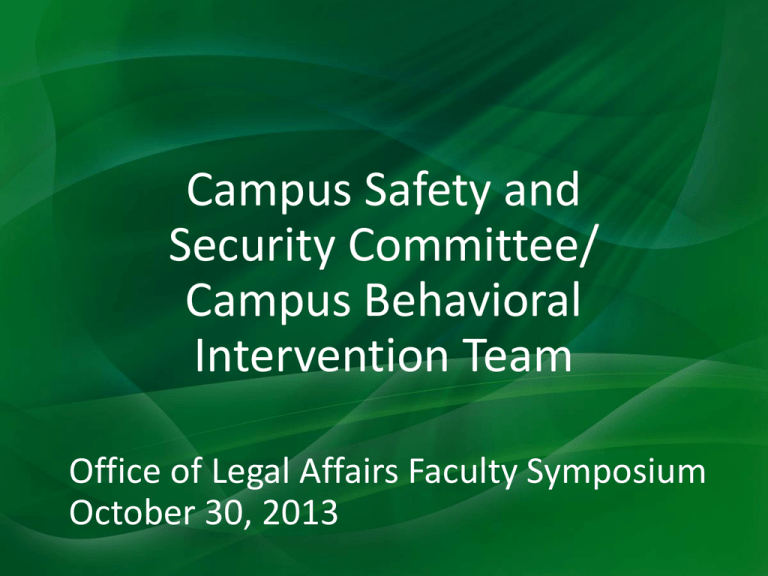
Campus Safety and Security Committee/ Campus Behavioral Intervention Team Office of Legal Affairs Faculty Symposium October 30, 2013 Campus Safety and Security Committee Composition • Chief of Police and Associate Vice Chancellor for Risk Management, Safety and Security • One-year student appointments (SGA president and GPSG representative) • Remainder serve staggered 3-year terms (two faculty members, Legal Affairs, International Programs, HR, Counseling, Center for Wellness Promotion, Advancement, Disability Services, Housing, Facilities, Academic Affairs, Dean of Students office, Business Affairs) Campus Safety and Security Committee Committee Charge • Develop and implement a comprehensive safety and security plan. – – – – Crime prevention Safety education Threat assessment Alcohol/drug education • Recommend changes in policies or procedures. • Place financial expenditures in priority order. • Focus on threats from criminal and violent behavior, not “all hazards.” • Annually assess results. Campus Safety and Security Committee Get Involved • Meetings • campussafety.uncc.edu – – – – Committee information/updates Annual reports Contact form Emergency contact information/incident report link • police.uncc.edu – Clery Act annual security report – Training videos – Complaints/commendations Campus Behavioral Intervention Team (CBIT) Composition • The following individuals (or designees) as permanent members: – – – – – – – Dean of Students, as Chair Director of the Counseling Center Director of Police and Public Safety Director of Housing and Residence Life Associate Provost for Academic Services Senior Associate Dean of Students Dean of the Graduate School • Alternates and invitees (Legal Affairs, HR) Campus Behavioral Intervention Team (CBIT) CBIT Charge/Mission • Charge (University Policy 408, Student Involuntary Protective Withdrawal Policy) – “ . . . to meet regularly, and on an emergency basis as necessary, to discuss issues relating to student behavioral concerns.” • Mission: – Review situations involving students who have demonstrated behaviors of concern; – Recommend appropriate intervention strategies; – Provide training and awareness regarding behavioral concerns to the campus community. Campus Behavioral Intervention Team (CBIT) Students of Concern • Definition: – “ . . . a student who is suffering from a medical or psychological disorder and, as a result of the disorder, presents a direct threat to the health or safety of others.” • Relationship to Conduct Process: – “Involuntary protective withdrawal is not a substitute for appropriate disciplinary action.” CBIT/Conduct Intake Process Office of the Dean of Students incidentreport.uncc.edu Possible outcomes: • • • • • • No action Faculty/staff follow-up Housing & Residence Life follow-up Counseling Center referral “Care and concern” meeting Police check-in • • • • • • Parental contact Referral to conduct process Voluntary withdrawal Interim protective withdrawal Involuntary withdrawal Hospitalization Impact of Mental Health Issues on Academic Performance and Retention Impact of Mental Health Issues on Academic Performance and Retention • Goals – Briefly review some research on the impact of mental health concerns on academics. – Share data about what UNC Charlotte students tell us about impact of mental health on academic performance. – Suggest ways faculty can help. The Impact of Mental Health • Developing depression was the most critical event that led students to consider withdrawing from the university (Pleskac, et al., 2011). • Students with mental illness report less engagement on campus and poorer relationships, factors that were associated with lower graduation rates (Salzer, 2012). Other findings • Stress-related coping strategies had a direct effect on social integration and continued college enrollment (Bray, Braxton, and Sullivan, 1999). • Retention rate of students who received psychological counseling was 14% higher than for students who did not (Kitzrow, 2003). UNC Charlotte students • Within the last 12 months: • Felt things were hopeless – 44.7% • Felt so depressed it was difficult to function – 30% • Felt overwhelming anxiety – 47.7% Source: National College Health Assessment, spring 2013, n=1,171 UNC Charlotte students • Factors affecting academic performance (incomplete, dropped course, poor grade): • • • • Stress Sleep Difficulties Anxiety Depression 27.5% 18.8% 18.6% 11.9% Source: National College Health Assessment, spring 2013, n = 1,171 Students who use the Counseling Center • Either prior to college, after starting college, or both, students report that they have: • • • • • Had prior counseling Taken medication for mental health Considered attempting suicide Made a suicide attempt Been hospitalized for mental health Source: UNC Charlotte Standardized Data Set, 2012-2013 49% 39% 30% 10% 8% Outcome • Over 21% of clients said they were thinking of leaving UNC Charlotte before starting counseling. Of those, 75% agreed or strongly agreed that counseling helped them stay at UNC Charlotte. • Over 30% of clients said they were having significant academic problems before starting counseling. Of those, 73% agreed or strongly agreed that counseling helped them improve their academic performance. • 97% agreed or strongly agreed with the statement, "If I were to need help again, I would come back to the Counseling Center.” How faculty can help • Identify and respond to students who may be experiencing psychological distress • Consult with counseling staff when you have questions • Refer students who may be in psychological distress http://counselingcenter.uncc.edu/home/concerned-about-astudent • Signs and symptoms of distress • Guidelines for responding • Consultation • Referral guidelines Gatekeeper Training o Fast, convenient, engaging o Completed in 45minutes--in one or more sittings o Access online, 24/7 o Simulation Format: Learn through virtual role-play o Practice having conversations with up to 5 virtual students National survey at over 72 colleges and universities: 96% would recommend At-Risk to a colleague. (www.kognito.com/atrisk/research) At Risk o Adopted at over 50 campuses since 2009 o First simulation listed in national “best practice” registry o Created by leading experts in mental health and learning technology National survey: 85% reported that after taking AtRisk they were more confident in their ability to help a suicidal student. (www.kognito.com/atrisk/research) How to Enroll • • • • To access the course, log on to http://aruf.kognito.com (enrollment key: uncc89) Take 45-minute course Complete follow up survey Return to the course as many times as you wish during the year Questions?



